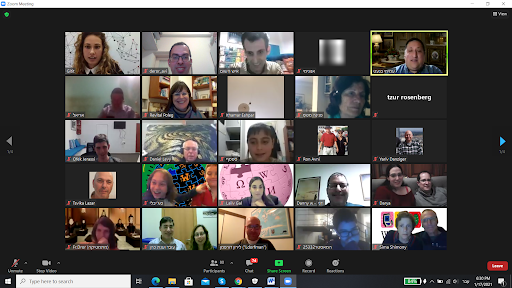A guide to building a strong and productive remote work culture
- Kevin Oskow
- September 27, 2021
- 6 Minute Read

Work culture is the sum total of the habits and beliefs that shape the interaction among the workforce.
To put it simply, work culture is the aggregate of how the managers interact with the subordinates and how the subordinates interact among themselves to accomplish the shared vision.
Work culture is relatively easy to cultivate and fine-tune in a physical work-space. It is far harder when teams collaborate remotely. It is difficult to substitute informal hallway conversations and regular meetings with Zoom calls.
Though challenging the task is certainly not impossible. Zapier showed the way a decade ago when tools for communication were comparatively primitive. At present, Toptal is the world’s largest fully remote company with 600 full-time employees spread across 70 countries.
In this article, we explore how to run remote teams seamlessly without sacrificing productivity or profitability, and cultivating remote work culture.
Tips For Building And Managing Remote Work Culture
1. Clear Communication Brings Efficiency
This is the inevitable sticking point when it comes to building remote work culture. Humans communicate not only verbally, but also with nuances expressed by facial expressions and mannerisms.
Without the added texture of nonverbal cues, there is bound to be a lack of clarity. Stripped of nuances, words often lose their candor and create a scope for misunderstanding.
Further, there is no easy way to approach another team member. This can prove to be an aggravating factor.
What is needed is a candid one-on-one conversation, as often as possible. Remember that with team members in a different time zone, communication can be burdensome.
It is time to instill asynchronous communication skills among the workforce. Employees have to learn that there would be a lag between their query and the response. Coping with it demands time and an ability to problem-solve on one’s own without hand-holding.

2. Troubleshoot Collaboration Problems With Suitable Tools
In many fields, remote work has become the norm rather than the exception. A 2020 Growmotely study showed that 74% of professionals believe that remote work culture is here to stay. 76% of entrepreneurs share this opinion. Those are substantial numbers.
This paradigm shift would not have been possible without the huge leap forward of easy-to-use collaborative software.
There is only so much that can be done through email.
Zoom is an ideal example of lightweight meeting software that has enabled remote work. It became the mainstay of businesses big and small during the Covid-19 pandemic. Although similar software had existed in the past, namely Cisco GoToMeeting and WebEx, Zoom stood out because of its straightforward UI and simple navigation. By the end of 2020, users had downloaded it 485 million times.
Besides Zoom, specialized communication tools, such as Slack, help remote team members stay in constant touch. Slack provides ease of use and also packs in a lot of powerful features that make it far more versatile than a chat tool such as WhatsApp or Skype.
There is a superb search function that allows users to locate old chats and messages instantly. Slack also allows users to set up bots that can perform a multitude of functions, such as tracking expenses, sending reminders of upcoming meetings, and managing daily schedules.
For project management, collaboration platforms such as Trello come in handy. Through boards, cards, and innovative to-do lists, it makes team management easy to accomplish.
Jira, Microsoft Teams, Google Workspace, Asana, Zoho – the list is endless and diverse. Whatever the type of business, there is a collaborative software suite that perfectly meets the requirements.
3. Recruit Teams With Right Mindset
Not everyone is suitable for remote work culture. Just like not everyone is suited for a 90-minute daily commute followed by a 9–5 job and another 90-minute commute back home.
What are the traits that HR must look for?
- Exceptional Work Ethics
The best remote employees are those who will find something to do even if they have not been assigned anything for that hour.
Essentially, those who rank high on conscientiousness and do not take remote work as an opportunity to play Minecraft or watch the latest episodes of Clickbait on Netflix on the company’s dime. Besides this to improve employee satisfaction you can reward them with custom 3d printed gifts. For that you can use a 3d modeling tool available online.
- Can Work Without Supervision
Obviously, remote work indicates a lot of hand holding is not possible. Anyone who is part of remote teams has to be a self-starter and get things done without always looking to their superior for guidance.
This calls for a fair bit of autonomy and a sense of accountability. The employee must have sufficient domain knowledge and confidence that when faced with an A/B situation, the decision they take is rational and they can back it up by logic if asked.
It goes without saying that autonomy is a two-way street. For the employee to exert it, those above him have to be willing to let go of the tight leash.

4. Create Subgroups
Humans are social animals. We tend to bond and form relationships. It is a trait we share with most other primates.
The essential human psychology, barring very few exceptions, gravitates towards becoming part of a collective.
Perhaps it is because, when compared to other animals, humans are exceedingly frail, this survival instinct has been passed down over thousands of years.
It is quite difficult to make that happen remotely. Not that technology is a bar–after all, people find new friends on social media all the time.
How can a manager aid the development of groups? Make local meetups possible. Not only possible but actively encourage team members who stay in the same geographical area to meet up once a week for group activity.
It is important to remember that isolation causes a lack of motivation and a general sense of malaise. Set up a buddy system. Pair workers on the same task and ask them to be constantly in touch with one another.
If physical meetups are not possible, video chats have to take their place.

5. Stress On Accountability
To make remote work a success, all the participants have to be equally invested in the success of the enterprise.
Accountability is a must. When you set a deadline, it has to be met without a lot of poking and prodding.
What works in an office–a gentle reminder from the boss about pending work–is hardly practical when people are separated by dozens or even thousands of miles and completely dependent on IT tools for collaboration.
Chart the workflow, assign tasks and weed out those who are unable to deliver consistently. It is a simple philosophy and works without fail.
Also read: How to build high-performing teams – Remotely?
On a Final Note
Remote work is here to stay. How much it infiltrates an organization would depend on the domain. A software firm is better equipped to handle remote teams when compared to a logistics hub.
Most businesses have indicated that they would prefer to have a hybrid model when the pandemic is over sometime in 2023. Employees would attend office for a couple of days and work from home for the rest of the time.
Remote work is much more than being able to share audio and video or share a spreadsheet across five different laptops at the same time.
Managers have to evolve in keeping with the times. They have to ensure a positive job experience even when someone is across the continent.
Uplers can provide invaluable assistance with a transition that is so radical. They have emerged as a leader in providing talented manpower solutions. Therefore, remote team management shall become much easier with an expert in the field advising you and providing you a steady supply of pre-vetted talent.
It is not an easy job by any means, but from Microsoft to Lockheed Martin, every employer wants to make it a success.

Thank you for submitting the details!
We will keep your information safe. Feel free to contact us with any questions at hello@uplers.com
Please check your email for next steps shared by Robert.


















